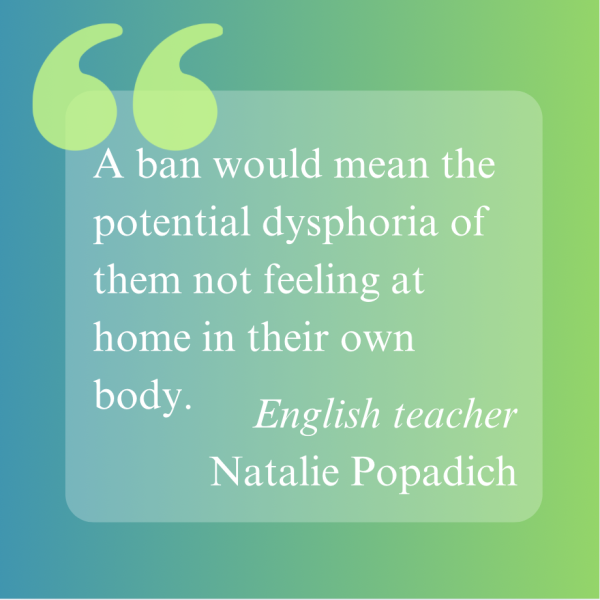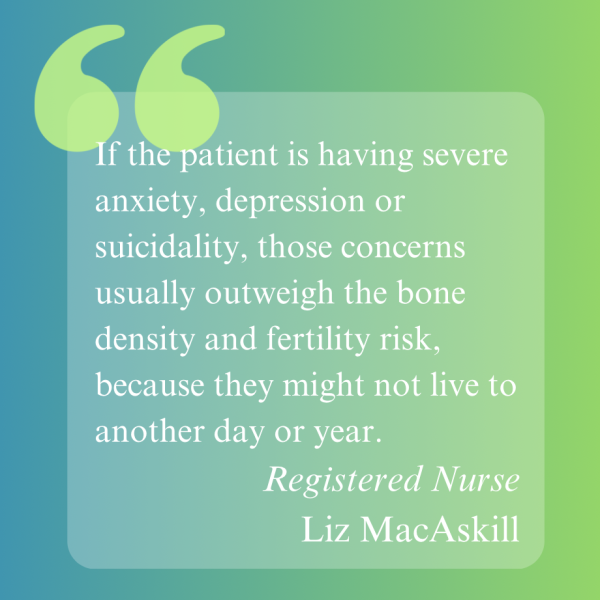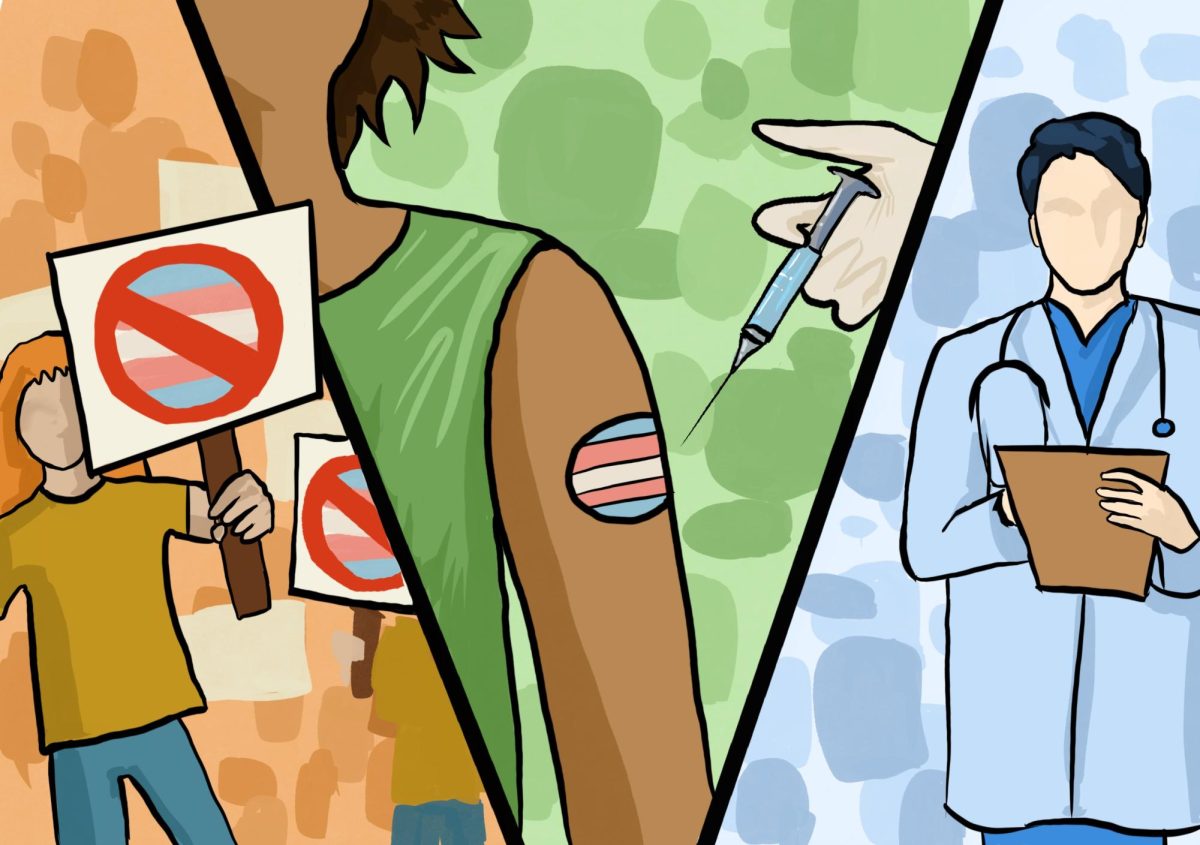Trigger warning: This story mentions self-harm and suicide. Call or text 988 for support if you are experiencing thoughts of suicide or self-harm.
The U.S. Supreme Court is currently considering whether states should have the right to ban puberty blockers, medications that postpone puberty in children. It heard oral arguments about a Tennessee law restricting gender-affirming care for minors on Dec. 4, after the American Civil Liberties Union challenged the law on the basis of discrimination.
Puberty blockers are medications that suppress sex hormones. Out of their several uses, they are notably used to treat early-onset puberty, as well as to delay the development of permanent secondary sex characteristics — such as a deeper voice or breast tissue — in transgender minors, providing them time to explore their gender identity. Although they are generally known as puberty blockers, they simply delay its onset, and are referred to as “puberty-pausing medications” by some gender health scientists. Following months of consultation with mental health professionals, endocrinologists and pediatricians, and with parents’ consent, doctors can prescribe blockers to youth experiencing gender dysphoria, the psychological distress that occurs when someone’s gender identity differs from their sex assigned at birth.
Liz MacAskill is a registered psychiatric mental health nurse and crisis counselor for the Trevor Project, an LGBTQ+ youth suicide prevention organization. She says talking to transgender teens in crisis and witnessing their pain firsthand demonstrates the importance of access to gender-affirming care.
“For the kids who don’t have access to puberty-pausing medications, and they have already started to notice these secondary sex characteristics, it is very distressing, and that is part of what motivated me to attend nursing school, to become a mental health psychiatric nurse, so that I can provide psychotherapy and gender-affirming support to trans people,” MacAskill said. “It is life-changing, because if a transgender person goes through puberty and isn’t able to pause puberty and think about how they want to proceed, the secondary sex characteristics are permanent.”
Michigan high school English teacher and trans woman Natalie Popadich, whose 12-year-old child Max identifies as non-binary and uses puberty blockers, says the medications have provided Max the comfort of living in a body that matches their gender identity, without the stress of it developing in a way that would cause dysphoria. While Democrats control Michigan’s Senate, its Republican House of Representatives has introduced bills aimed at outlawing doctors’ ability to provide puberty-blocking drugs to minors.

“Since starting puberty blockers, Max is still the same outgoing, talented and funny kid they always were,” Popadich said in an email. “We appreciate that we can get the care that our doctors have prescribed so that Max can live their life in the most authentic way possible. A ban would mean the potential dysphoria of them not feeling at home in their own body.”
Biology and Physiology teacher Lora Lerner echoes the importance of puberty blockers as a way for adolescents to pause development for a few years while examining their gender identity and what next steps they want to take if they choose to transition, which may include hormone therapy or surgical procedures. However, Lerner cautions against treating puberty blockers like a harmless “pause button.” She believes families and teens must be aware of the potential long-term consequences of taking puberty blockers and states that since puberty is also when the brain and bones develop, in addition to secondary sex characteristics, puberty blockers could possibly have the effect of stunting cognitive development or impacting future fertility, and have been shown to compromise bone health.
“To ask a 12-year-old kid to make a decision about their future fertility is hard,” Lerner said. “You can’t realistically expect a 12-year-old to weigh that consequence against how they feel about their gender — their maturity isn’t even at that stage. A doctor can talk to their parents, but the parents might have different goals and ideas for their child. Sometimes medical decisions are hard to weigh. People who want to pursue this are going to have to live with a level of uncertainty.”
Lerner proposes that while puberty blockers are being studied more thoroughly, they should be unavailable to the general public, but individuals who want them can sign up to be part of a clinical trial. This method is similar to how other risky medications, such as experimental cancer drugs, are treated.
However, MacAskill says that due to the stigma surrounding gender-affirming care, there isn’t much funding for research surrounding blockers, but she believes they are safe enough for doctors to continue to prescribe blockers. Furthermore, the American Medical Association, Endocrine Society and World Professional Association for Transgender Health support puberty blockers’ use, and healthcare providers follow thorough medical guidelines when prescribing the medications. Steps are also taken to minimize future medical risks — for example, MacAskill says bone density is monitored throughout treatment, patients take calcium supplements and are offered fertility preservation options.
Banning puberty blockers out of medical caution could carry severe potential consequences, as shown by the increased suicide attempts among young transgender and non-binary people in states with anti-transgender laws. The suicide risk for youth in the LGBTQ+ community is significantly higher than the general population, but a study published in the Journal of the American Medical Association found that puberty blockers and gender affirming hormones led to a 73% decrease in suicidal ideation in youth — although other studies have found no correlation between a lack of gender-affirming care and completed suicides. Lerner and MacAskill believe that balancing physical and mental health concerns is a complex ethical dilemma with no clear-cut solution.

“It’s so important that if a patient wants to take this medication, that they see a really highly qualified professional healthcare team to assess how bad their dysphoria is,” MacAskill said. “If the patient is having severe anxiety, depression or suicidality, those concerns usually outweigh the bone density and fertility risk, because they might not live to another day or year. I think it’s patient dependent, and the potential risks do need to be weighed carefully against each other.”
Popadich agrees, describing how when Max expressed concerns over the traumatic effect puberty would have on them, their parents weighed the medical risks outlined by their endocrinologist. They ultimately decided that the mental health benefits of the medications are paramount to everything else in Max’s life.
The potentially extensive medical drawbacks of puberty blockers are part of why they’re being banned and more cautiously prescribed throughout the world. For example, a 2024 U.K. review found that studies examining blockers’ safety were of poor quality, the potential side effects were concerning and that withdrawal does not lead to increased suicides, leading to bipartisan British political support of the ban. Now, only U.K. children already receiving gender-affirming care or those who are part of a clinical trial can access puberty blockers.
However, the issue of gender-affirming care is more polarizing in the U.S, as bans are often formed along party lines and motivated by political ideological battles. Since 2021, 26 states, all Republican-led, have restricted gender-affirming care, while Democrat-controlled states permit and protect their use. Anti-transgender sentiment is prevalent among Republican politicians and campaigns. For example, in his 2025 inaugural address, President Trump said, “As of today, it will henceforth be the official policy of the United States government that there are only two genders, male and female.” To Popadich, the negative political fixation towards transgender people is unwarranted.
“The hundreds of bills targeting trans individuals who make up such a small part of the population is mind-blowing,” Popadich said. “As often is the case, groups with less political clout are being scapegoated to appeal to the MAGA base of the Republican party.”
To Lerner, the U.K. approach of making puberty blockers a medical issue rather than a political one is a step in the right direction. She believes that, in the United States, the issue has been politicized and made overly emotionally charged, and Lerner advocates for greater scientific education and support for LGBTQ+ youth.
“People who want you to vote a certain way understand that if they start saying, ‘There will be transgender people everywhere as a result of puberty blockers,’ they’ll stir up a lot of negative feelings,” Lerner said. “I’m not even sure those people care that much about that particular issue, but it’s very useful in creating negative sentiment. My personal feeling is that they’re picking on the most vulnerable group in society, pretty much — transgender kids, who already have a really hard road in front of them.”
In a time of increasing transphobic sentiment in America, Lerner says parents, schools and communities should support LGBTQ+ kids’ mental health to decrease their risk of suicide and self-harm. MacAskill agrees, stressing the importance of supporting queer healthcare organizations, such as the Human Rights Campaign and the Gay and Lesbian Medical Association, and crisis hotlines such as 988 and The Trevor Project, which can help kids in states where access to gender-affirming service is banned or restricted.
“Part of why these bans across the states are really just breaking the hearts of the healthcare providers that care so much about this is because there isn’t a ton that we can do beyond just trying to support their mental health,” MacAskill said. “Many Americans have forgotten to recognize transgender and queer folks as human beings who deserve respect and equitable health care.










